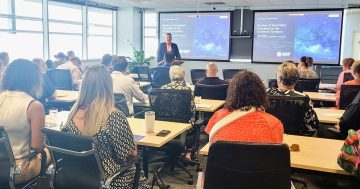 The Department of Justice says its policy of promoting education in the State’s prisons is playing a key role in rehabilitation efforts.
The Department of Justice says its policy of promoting education in the State’s prisons is playing a key role in rehabilitation efforts.
Superintendent of Casuarina Prison, James Schilo said basic numeracy and literacy skills offered a gateway to better social and economic mobility post-release.
“It presents prisoners with an opportunity to break the cycle of crime,” Superintendent Schilo said.
“Education encapsulates the possibility of change,” he said.
“It helps prisoners from different backgrounds and experiences to try and better themselves and stop the crime cycle and its intergenerational impacts.”
Superintendent Schilo said the theme of this year’s Adult Learners Week (1-8 September), Change Your Story, resonated with prisoners who had given powerful presentations at a special event in Casuarina’s education campus.
He said a Welcome to Country was delivered in Noongar and English by one prisoner who said he was privileged to know his culture was being taught in prison.
Superintendent Schilo said another prisoner talked about goal-setting and how he had benefitted from the courses he had completed while in prison, and planned to be a strong role model to his children in future.
Commissioner for Corrective Services, Mike Reynolds said a range of education opportunities were offered to people in custody.
“We aim to ensure people are leaving prison with skills to help them better reintegrate with the community post-release — from literacy and numeracy units to university-level degrees and vocational training which provides job-ready qualifications,” Commissioner Reynolds said.
He said Casuarina Prison currently had capacity to hold 1,438 adult male prisoners, but a planned expansion would see the number of general-purpose beds increase to 1,900 with prison education to increase accordingly.











